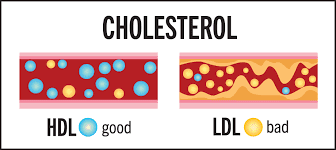The Comprehensive Guide to Cholesterol: Demystifying Good Cholesterol, Bad Cholesterol, and Dietary Fats
Cholesterol - a term often associated with health concerns, but what exactly is it? In this article, we'll delve into the world of cholesterol, exploring its different types, and functions, and dispelling common myths. So, grab a seat, and let's unravel the mysteries of cholesterol!
Introduction
Cholesterol, a waxy, fat-like substance, is essential for various bodily functions. Despite its importance, misconceptions often shroud its role. In this article, we'll break down the roles of good and bad cholesterol, explore where cholesterol comes from, and debunk prevalent myths.
Cholesterol: The Basics
Cholesterol is a vital component of cell membranes and plays a key role in hormone production and digestion. It's transported through the bloodstream by lipoproteins, which come in two main types: high-density lipoprotein (HDL) and low-density lipoprotein (LDL).
Good Cholesterol (HDL): The Guardian of Your Heart
HDL cholesterol, often dubbed "good" cholesterol, acts as a protective shield for your cardiovascular system. It scavenges excess cholesterol from the bloodstream and transports it to the liver for elimination, reducing the risk of artery blockages.
Bad Cholesterol (LDL): Navigating the Risks
Conversely, LDL cholesterol, known as "bad" cholesterol, can lead to plaque buildup in arteries, increasing the risk of heart disease and strokes. Managing LDL levels is crucial for maintaining heart health.
Cholesterol Production: Unraveling the Process
While our bodies naturally produce cholesterol, diet also contributes to its levels. The liver manufactures cholesterol from glucose and fats, ensuring a delicate balance that supports various physiological functions.
Fact or Fiction: Cholesterol from Bread, Noodle, and Rice?
Contrary to a common myth, cholesterol primarily comes from the liver's production rather than from grains like bread, noodles, or rice. However, a diet rich in saturated and trans fats can elevate LDL cholesterol levels.
Fat and Cholesterol: The Connection Demystified
Dietary fats influence cholesterol levels, but the impact isn't uniform. Unsaturated fats, found in foods like avocados and nuts, can improve cholesterol profiles, while saturated and trans fats should be limited to maintain heart health.
The Brain-Cholesterol Connection: Fueling Cognitive Health
Did you know that about 90% of the brain's structure is composed of cholesterol? Cholesterol is essential for nerve cell communication, and maintaining optimal levels contributes to cognitive function and overall brain health.
Understanding the Cholesterol Numbers: What Do They Mean?
When you get a cholesterol test, the numbers may seem confusing. Total cholesterol, HDL, LDL, and triglycerides each play a role in assessing heart health. Consulting a healthcare professional helps interpret these values.
Diet and Lifestyle Tips for Healthy Cholesterol Levels
Achieving and maintaining healthy cholesterol levels involves a balanced diet rich in fruits, vegetables, whole grains, and lean proteins. Regular exercise, avoiding smoking, and managing stress also contribute to a heart-healthy lifestyle.
Dispelling Common Myths about Cholesterol
Let's bust some myths! Cholesterol isn't solely obtained from certain foods, and not all fats are bad. Differentiating between fact and fiction empowers you to make informed choices for your well-being.
Saturated Fat, Unsaturated Fat, and Trans Fat: Exploring Types, Examples, Pros, and Cons
When it comes to dietary fats, not all fats are created equal. Understanding the differences between saturated fat, unsaturated fat, and trans fat can empower you to make healthier choices for your diet. Let's delve into each type, explore examples, and weigh their respective pros and cons.
- Saturated Fat: Examples: Butter, cheese, fatty cuts of meat, coconut oil
- Pros: Provides energy, aids in hormone production, supports cell membrane structure
- Cons: Raises LDL (bad) cholesterol levels, increases heart disease risk, contributes to inflammation
- Unsaturated Fat: Examples (Monounsaturated): Olive oil, avocados, nuts, seeds
- Examples (Polyunsaturated): Fatty fish (salmon, mackerel), flaxseeds, walnuts
- Pros: Supports heart health, lowers LDL cholesterol levels, provides essential fatty acids (omega-3 and omega-6)
- Cons: High calorie content, excessive intake can lead to weight gain
- Trans Fat: Examples: Processed foods (margarine, baked goods), fried foods, some fast foods
- Pros: None - Trans fat consumption should be minimized or eliminated
- Cons: Raises LDL cholesterol, lowers HDL (good) cholesterol, increases heart disease risk, promotes inflammation
Incorporating unsaturated fats, especially those rich in omega-3 fatty acids, can have positive effects on heart health. Reducing saturated and trans fat intake is advisable to lower the risk of heart disease. Remember, moderation and balance are key to maintaining a healthy diet.
Conclusion
Cholesterol, often misunderstood, is an indispensable component of our bodies. Both good and bad cholesterol have distinct roles, and their delicate balance influences heart and brain health. By understanding cholesterol and adopting a heart-healthy lifestyle, you take a significant step toward overall well-being.
FAQs
Is all cholesterol harmful?
Cholesterol isn't inherently harmful; it's about the balance between good (HDL) and bad (LDL) cholesterol. HDL promotes heart health, while elevated LDL levels can pose risks.
Can I lower my cholesterol through diet alone?
Diet plays a crucial role, but genetics and other factors also influence cholesterol levels. Consult a healthcare professional for personalized guidance.
Are eggs bad for cholesterol?
Eggs can be part of a healthy diet for most people. While they contain dietary cholesterol, they have a limited impact on blood cholesterol levels for many individuals.
How often should I get my cholesterol checked?
Routine cholesterol screenings are advisable, especially if you have risk factors for heart disease. Consult your healthcare provider for recommendations.
Are there medications to manage cholesterol?
Yes, if lifestyle changes aren't sufficient, medications can help manage cholesterol levels. Your doctor can determine the appropriate approach based on your health status.

Comments
Post a Comment